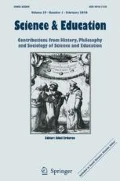Abstract
‘Scientific thought’ is regarded here as both a type of goal-directed behaviour (practice) and its product, and the question of its ‘nature’ posed in terms of that goal and of means appropriate for achieving it, preferably with regard to an existing paradigm (exemplar) such as the ‘Galilean-Newtonian’. ‘Empiricism’, a widely received view of the nature of science, is examined and rejected, as is the general idea that scientific thought has ‘philosophical foundations’. The question of the actual or possible scientific status of ‘the human sciences’ is raised and some methodological guidelines for an answer to it suggested.
Similar content being viewed by others
References
Althusser, L.: 1969, For Marx, Allen Lane, The Penguin Press, London.
Althusser, L.: 1990, Philosophy and the Spontaneous Philosophy of the Scientists, Verso, London.
Althusser, L. and Balibar, E.: 1970, Reading Capital, New Left Books, London.
Bachelard, G.: 1986, The New Scientific Spirit, Beacon Press, Boston.
Balibar, E.: 1978, ‘From Bachelard to Althusser: the Concept of “Epistemological Break”’, Economy and Society 7, 207–237.
Boyd, R., Gasper, P., and Trout, J. D. (eds.): 1991, The Philosophy of Science, MIT Press, Cambridge, Mass..
Cartwright, N.: 1983, How the Laws of Physics Lie, Clarendon Press, Oxford.
Chalmers, A. F.: 1982, What is this Thing Called Science? (2nd ed.), University of Queensland Press, St Lucia, Queensland, Australia.
Cromer, A.: 1993, Uncommon Sense. The Heretical Nature of Science, Oxford University Press.
Dewey, J.: 1938, Logic, the Theory of Inquiry, Holt, Rinehart and Winston, New York.
Feyerabend, P. K.: 1981, Philosophical Papers, 2 vols, Cambridge University Press, Cambridge.
Galileo: 1962, Dialogue Concerning the Two Chief World Systems — Ptolemaic and Copernican (trans. S. Drake), University of California Press, Berkeley and Los Angeles.
Galileo: 1974, Two New Sciences (trans. S. Drake), University of Wisconsin Press, Madison, Wisconsin.
Hacking, I.: 1983, Representing and Intervening, Cambridge University Press, Cambridge.
Huxley, T. H.: 1893/1968, Collected Papers, 4 vols, Greenwood Press, New York.
Lakatos, I.: 1978, Philosophical Papers, 2 vols, Cambridge University Press, Cambridge.
Lecourt, D.: 1975, Marxism and Epistemology, New Left Books, London.
Lewin, K.: 1935, ‘The Conflict between Aristotelian and Galilean Modes of Thought in Contemporary Psychology’, in K. Lewin (ed.), A Dynamic Theory of Personality, McGraw-Hill, New York, 1–42.
Miller, R. W.: 1987, Fact and Method, Princeton University Press, Princeton.
Mittelstrass, J.: 1972, ‘The Galilean Revolution. The Historical Fate of a Methodological Insight’, Studies in History and Philosophy of Science 2, 297–328.
Nowak, L.: 1980, The Structure of Idealization, D. Reidel, Dordrecht.
Pinker, S.: 1994, The Language Instinct, Allen Lane, The Penguin Press, Harmondsworth.
Popper, K. R.: 1972, The Logic of Scientific Discovery (3rd ed.), Hutchinson, London.
Rorty, R.: 1979, Philosophy and the Mirror of Nature, Princeton University Press, Princeton.
Ruby, J. E.: 1986, ‘The Origins of Scientific “Law”’, Journal of the History of Ideas 47, 341–359.
Sambursky, S. (ed.): 1975, Physical Theory, Pica Press, New York.
Suchting, W. A.: 1986, Marx and Philosophy, Macmillan, London.
Suchting, W. A.: 1992, ‘Constructivism Deconstructed’, Science & Education 1, 223–254.
Suchting, W. A.: 1994, ‘Notes on the Cultural Significance of the Sciences’, Science & Education 3, 1–56.
Tiles, M.: 1984, Bachelard: Science and Objectivity, Cambridge University Press, Cambridge.
Waldrop, M. M.: 1994, Complexity, Penguin Books, Harmondsworth.
Weber, M.: 1949, The Methodology of the Social Sciences, The Free Press, New York.
Westfall, R. S.: 1980, Never at Rest. A Biography of Isaac Newton, Cambridge University Press, Cambridge.
Wittgenstein, L.: 1953, Philosophical Investigations, Blackwell, Oxford.
Zilsel, E.: 1942, ‘The Genesis of the Concept of Physical Law’, Philosophical Review 51, 245–279.
Wolpert, L.: 1992, The Unnatural Nature of Science, Faber and Faber, London.
Author information
Authors and Affiliations
Additional information
This paper is a version of one commissioned for the forthcoming International Handbook of Science Education edited by Ken Tobin and Barry Fraser (Kluwer Academic Publications). Thus it deals in a condensed way with wide-ranging and complex matters that would ordinarily be treated separately and at greater length. (Editor)
Rights and permissions
About this article
Cite this article
Suchting, W.A. The nature of scientific thought. Sci Educ 4, 1–22 (1995). https://doi.org/10.1007/BF00486588
Issue Date:
DOI: https://doi.org/10.1007/BF00486588



